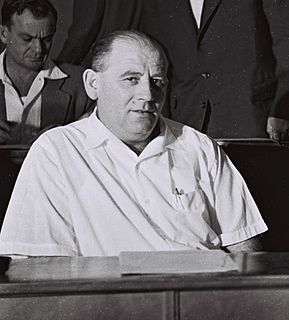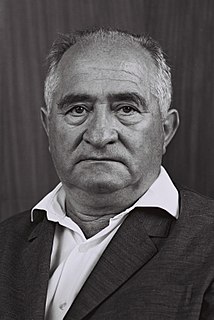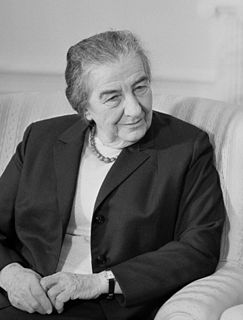Related Research Articles
Mapai was a democratic socialist political party in Israel, and was the dominant force in Israeli politics until its merger into the modern-day Israeli Labor Party in 1968. During Mapai's time in office, a wide range of progressive reforms were carried out, as characterised by the establishment of a welfare state, providing minimum income, security, and free access to housing subsidies and health and social services.
Rafi was a center-left political party in Israel, founded by former Prime Minister, David Ben-Gurion in 1965. In 1968 it was one of three parties that merged to form the Israeli Labor Party.

Gahal was the main right-leaning political alliance in Israel, ranging from the centre-right to right-wing, from its founding in 1965 until the establishment of Likud in 1973. It was led by Menachem Begin.

Yosef Aharon Almogi was an Israeli politician who served as a member of the Knesset between 1955 and 1977, as well as holding several ministerial posts.
Elections for the sixth Knesset were held in Israel on 2 November 1965. Voter turnout was 85.9%.
The Alignment is the name of two political alliances in Israel, both of which ended their existence by merging into the Israeli Labor Party.

Ora Namir was an Israeli politician and diplomat who served as a member of the Knesset from 1974 until 1996, as well as holding the posts of Minister of the Environment and Minister of Labour and Social Welfare during the 1990s. She later became the country's ambassador to China and Mongolia.

Mordechai Surkis was an Israeli politician who was the first mayor of Kfar Saba, as well as serving as a member of the Knesset for Rafi and its successors between 1965 and 1974.
Rafael "Rafi" Suissa is an Israeli politician who served as a member of the Knesset for the Alignment between 1981 and 1984, and as mayor of Mazkeret Batya on three occasions. He is currently a member of Mazkeret Batya local council.
Efraim Shalom was an Israeli politician who served as a member of the Knesset for the Alignment between 1984 and 1988. He was a prominent figure amongst the moshav community, serving as secretary of the Moshavim Movement from 1977 until 1984.

The thirteenth government of Israel was formed by Levi Eshkol on 12 January 1966, following the November 1965 elections. His coalition included the Alignment, the National Religious Party, Mapam, the Independent Liberals, Poalei Agudat Yisrael, Progress and Development and Cooperation and Brotherhood, and had eighteen ministers.

The fourteenth government of Israel was formed by Golda Meir on 17 March 1969, following the death of Prime Minister Levi Eshkol on 26 February. She kept the same national unity government coalition, including the newly formed Alignment alliance of the Labor Party and Mapam, as well as Gahal, the National Religious Party, the Independent Liberals, Poalei Agudat Yisrael, Progress and Development, Cooperation and Brotherhood. The only change to the cabinet was the scrapping of the Minister of Information post, with the previous post-holder Yisrael Galili becoming a Minister without Portfolio instead.

Mapam was a left-wing political party in Israel. The party is one of the ancestors of the modern-day Meretz party.
Municipal elections were held in Israel on 28 October 2003.
Municipal elections took place in Israel on 2 November 1993. They were the first in which Meretz and United Torah Judaism, who were founded after the previous round of municipal elections, stood candidates.
Municipal elections took place in Israel on 28 February 1989. They were originally meant to take place on 1 November 1988, but were delayed due to legislative elections taking place that day.
Municipal elections took place in Israel on 25 October 1983.
Municipal elections took place in Israel on 7 November 1978 and were the first Municipal in which Mayors and Council heads, and the Councils themselves, were elected in separate elections. These were also the first elections not to occur on the same date as a legislative election, and the first elections to take place after the 1977 election, which resulted in the Likud winning a plurality of seats and forming a government for the first time.
Municipal elections took place in Israel on 31 December 1973, having been delayed from their original date on 30 October because of the Yom Kippur War. They were the last municipal elections to take place on the date of a legislative election, and the first in which the newly formed Likud participated.
Municipal Elections took place in Israel on 28 October 1969, alongside a legislative election. They were the first to take place after the Six-Day War.
References
- ↑ Dar, Yoel (1965-11-08). "יש קולות - אבל אין קולות במועצה" [There are votes - but no members on the council]. National Library of Israel (in Hebrew). Davar . Retrieved 2022-09-01.